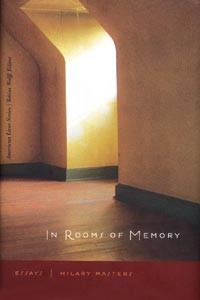By Hilary Masters
University of Nebraska Press, 243 pp., $24.95
Good story-telling often projects a certain inevitability: We sense the imminent arc -- the intent -- of The Great Gatsby before we know exactly what it is.
Essay-writing is different. What's more deadly than an essay whose direction you know from the first paragraph? Perhaps only a comedy routine with the punchlines delivered first.
Thus what a pleasure is In Rooms of Memory. In his new essay collection, novelist Hilary Masters offers humor, insight, anecdote, food-appreciation and more -- all while demonstrating the ability to zig (or zag) when others around him would forge straight ahead.
The 19 essays all seem to date from the past decade or so. As befits the author of the classic memoir Last Stands: Notes From Memory, the material examines the breadth of Masters' long experience, starting with his youth in 1930s Kansas, where he was raised by his grandparents. Yet no less than his light and self-deprecating wit, it's Masters' nimble mind, drawing connections and building metaphors, that makes most of these essays delightful.
Take "Double Exposure." The essay begins by discussing Kodak's Medalist camera, which Masters used as a young Navy man in the 1940s. If you fear this will be yet another digital-era requiem for film photography, you underestimate the essayist. In fact, it's is a charming, probing piece that weaves an account of a secret post-war mission involving the V-2 rocket with thoughts about the verisimilitude of both photos and words, as explored largely through a photography project by novelist Wright Morris.
Likewise, with "In My Orchard," Masters finds a case study in hubris in his own attempts to grow fruit trees in his little North Side yard. "Three Places in Ohio" weaves a personal health scare with a birthday jaunt with his wife, only to find a balm for mortality in small-town diner food.
Masters is especially keen to explore his personal history: his relationship with his parents (his father was famed poet Edgar Lee Masters) and grandparents; his troubled marriages; the parenting skills whose underdevelopment he frequently laments.
Two of the collection's stronger and lengthier pieces take this tack. In "A Day in Burgundy," Masters recounts one of his many trips to the French countryside, seasoned with ruminations on food, tourism, computers, history and his strained relations with his children. Similar introspection leavens the sardonic "Disorderly Conduct," built around an account of his absurd arrest in Maine, back in the 1970s.
It's a testament to Masters' fluid prose that despite their seeming digressions, these essays usually maintain momentum. His style is formal -- speckled with mildly fusty phrases like "it's to be remembered" -- but sensually pleasing. Describing his house, he writes, "To my wife's agitation, books are piled on our tables, spill in heaps from stuffed shelves and lie about the floor and on chairs like spoiled pets."
That's from "In Montaigne's Tower," constructed around a pilgrimage to said father of the essay. And Masters himself is a solid aphorist, with pungent lines like, "If freedom is to be gained, it is usually at the expense of others."
In Rooms of Memory has its weaknesses. Alongside "Montaigne's Tower," for instance, "Montaigne's Bordeaux" seems half-redundant. And occasionally, as in "Loitering on the Loire," Masters falls prey to the essayist's temptation to simply catalogue random musings. "Chimera," an attempt to de- and reconstruct forgotten notebook fragments, edges toward self-indulgence.
But such venial sins are more than atoned for by, if nothing else, Masters' frequent thoughtful interrogation of memory itself.
The title essay, for instance, explores memory as falsehood, even dramatizing how Masters himself purposefully fleshes out his own memoirs with invented detail. "The End of Something" addresses, tellingly, how our culture manages to be at once forgetful and nostalgic.
The lead piece, "Going to Cuba," especially demonstrates his keen awareness of the vagaries and pitfalls of memory. It concerns a 1950s dalliance with a mysterious woman, and dips into postmodernism: The woman is mythical -- but Masters acknowledges that, too, even as he spins the nominally true tale.
His point is not just the familiar one that we make, or at least remake, our memories, but the more subtle why. As Masters essays at one point, it's "to make things right." In a passage from "Passing Through Pittsburgh" (about traveling by train as a child, long before he moved here), he writes:
We make such narratives to iron out the discontinuity of our lives, give tumbled events a cause and effect -- even a reason that they might not have possessed. The endeavor comforts us as it helps us believe that we were, in some way, in charge of the past when it was happening -- a condescension as much as a folly -- though this behavior might explain the myopic affection we have for the past, worked into sweet nostalgia like a piece of leather until it is soft and supple to our self-appraisals.
In exploring the past as it lives in the present, Masters proves a companionable and erudite guide.















